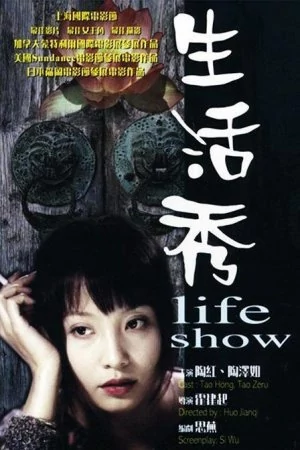Life Show

Life Show [Sheng Huo Xiu] is Huo's second film I come across, and similarly to Postmen in the Mountains, I'm pretty sure its appeal will be quite limited to the Western world. It's very much a mainland Chinese film, and if you're not called Zhangke Jia directing that film it means people won't have the immediate reflex to turn their heads. But if you ask me to pick between these two directors, Jianqi Huo is definitely the more interesting of the two. Life Show more than affirms this.

Thanks to an incredibly weird turn of events, both Postmen in the Mountains and Life Show are actually available on DVD in Belgium. There's really no telling what they are going to release here, and I'm pretty sure most films are simply picked by flinging a dart at a big board of titles at the opposite wall. Especially releases of East-Asian films seem impossible to predict, the upside being that once in a while we get some pretty unique local releases (and the obvious downside being that some big films are never released at all over here). Life Show is one of them. It's a pretty bare DVD release, but at least it's here with comprehensible subs.
While Postmen in the Mountains found a lot of its appeal in rural China, set completely in a mountainous landscape (what's in a title ...), Life Show lands itself in one of those semi-industrialized Chinese cities. High skyscrapers, deserted buildings, rundown alleys and skeleton construction sites are all part of the scenery. Life Show finds an even smaller biotope within this city, resting its shoulders on the life of a single women, managing a food stand in a small night market, selling duck necks.
Shuangyang, the main character, is actually a rarity in Chinese films. She is a strong, independent and forceful woman, running her business all by herself and bearing the fruits of her labor. Even though her business is small, it is quite successful. In between she takes care of her brothers and tries to get the family house back in her possession after some dubious trading deal during the Cultural Revolution. And if that wasn't enough already, her love life seems to be getting some fresh impulses. All these events cross her life, though the film keeps a firm focus on Shuangyang.

Life Show presents itself like a typical slice of life film, although the story is aiming a little more towards a climax then is usually the case. Many strands flow in and out of Shuangyang's life, many of them are never fully explored in the film, just slightly touched upon or hinted at. Only the romance that blooms between Shuangyang and one of her customers is fully expanded and forms the climax of the film. With almost all attention on Shuangyang, it's a good thing that Tao has the baggage to carry her role with pride. Supporting actors do their part, but are less noticeable.
Visually, Life Show is a pretty dark film. Of course, many scenes play at night, but even during the day Huo opts for dark alleys and plays with shadows in almost every scene. Red and green are dominating colors when he wants to lighten up the color palette, making this a typical Chinese product. Even though the film has very little landmark shots, its visual style is very pleasant and bears a lot of atmosphere. The tight setting and damp surroundings only add to this. The soundtrack is equally pleasant, with soft music and typical Chinese sounds. Nothing too special, but it suffices for a dear little film like this.

As the film continues we get acquainted with Shuangyang and find out she isn't exactly a perfect human being either. As strong as she might be, loneliness and doubt make her a little unstable, all of which is explored through her relationship. Though in the end, she is still able to stand up for herself, making sure she remains in control of her own life. The last shot and scene in the film are as telling as can be and reflect upon the whole film in a very soft yet human way, avoiding a happy end but keeping it hopeful nonetheless.
There is little to set this film apart from many of its peers, yet Huo has a more definite, visually pleasing style. Apart from that, it's just a pleasantly executed film featuring a strong lead and some good solid drama, splendid scenery and just breaths the couleur locale. It won't win many people to dive into mainland Chinese cinema, but those who have already acquired a taste for it will do well to look this one up.